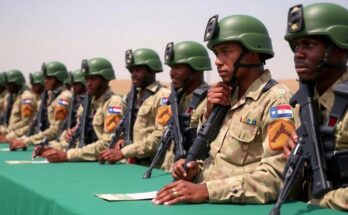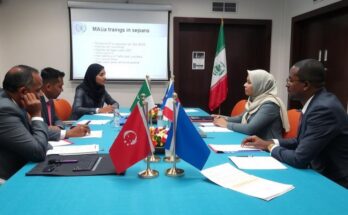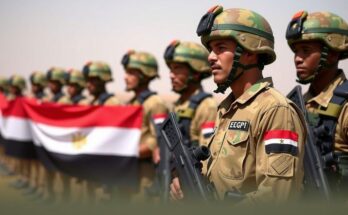The article discusses Russia’s potential loss of its naval base in Syria due to the resurgence of Syrian rebels and examines the implications for Russian military strategy. It highlights the possibility of Russia seeking alternative bases in Sudan and Libya, with current engagements linked to resource exploitation and geopolitical maneuvering amid ongoing conflicts in both regions.
The recent resurgence of power among Syrian rebels poses a significant challenge to Russia’s geopolitical objectives in the region. As the situation in Syria evolves, Russia risks losing its pivotal naval base in Tartus and the accompanying airfield at Khmeimim, both of which have been vital for projecting Russian military strength in the Mediterranean and supporting operations in Africa. With this potential loss, Moscow may turn its strategic focus towards war-torn Sudan and the politically fragmented Libya in an effort to secure new bases for its operations.
Historically, Russia’s military installations in Syria have underscored its ambitions to restore its influence in the Middle East and across Africa. Analysts suggest that a shift in control within Syria could hinder Russia’s ability to operate effectively and extend its influence in critical waters such as the Mediterranean and the Red Sea, especially in countering NATO. This concern prompts Russia to explore alternative locations for its military and economic interests as it withdraws from Syria.
Sudan presents a tantalizing prospect for Russia, which has engaged in negotiations for a naval base at Port Sudan. Despite earlier agreements being complicated by political instability, the recent conflict has seen Moscow positioning itself opportunistically to align with factions that can ensure its interests, particularly regarding access to Sudan’s substantial gold reserves. Russia’s Wagner Group has significantly profited from illicit gold mining operations in the region, generating billions since the onset of the Ukraine conflict.
On the other hand, Libya remains a critical player due to its strategic location and vast oil reserves. The Wagner Group has established a foothold there, supporting General Khalifa Haftar in his ongoing efforts to consolidate power. As conflicts within the nation continue, the Russia Africa Corps is reportedly expanding its military presence to secure influence while seeking to exploit Libya’s energy resources and mineral wealth.
Furthermore, allegations indicate that Russia is supplying arms to both sides of the Sudanese conflict, attempting to align with the most advantageous outcome. Such dual support strategy allows Russia to maintain its influence regardless of the eventual victor, although experts suggest that a decisive alignment with the Sudanese Armed Forces could expedite the establishment of a naval base in Port Sudan worth exploring.
Despite these emerging opportunities, experts caution that Russia currently lacks formal agreements or established facilities to compensate for the loss of Tartus. The complexities of both domestic and international political landscapes present considerable challenges to establishing a visible military presence in either Sudan or Libya.
This article examines the geopolitical landscape affecting Russia’s military ambitions in light of the potential loss of its naval base in Syria. With the Syrian civil war entering a new phase, Russian strategic interests are threatened, prompting a search for alternatives such as Sudan and Libya. The historical context of Russian military involvement in Syria, the significance of the naval base in Tartus, and Russia’s exploitation of unrest in Africa to secure military and economic footholds are vital to understanding the current dynamics at play. In particular, events in Sudan and Libya illustrate the intricate relationship between conflict, resource access, and geopolitical maneuvers. The interplay of these factors not only shapes Russian foreign policy but also impacts regional stability. Analysts provide insights into Russia’s opportunism amid shifting alliances, indicating that Moscow’s strategic calculations are primarily driven by its need to project power and secure economic resources. The connection between military operations and access to strategic resources is evident throughout this analysis, highlighting how the fallout from the Syrian conflict may lead to reshaped landscapes in both Sudan and Libya as potential new bastions for Russian influence.
In conclusion, as Russia grapples with the ramifications of its diminishing control in Syria, it is likely to pivot its focus toward Sudan and Libya as alternatives for establishing military bases. The ongoing conflicts in both regions create opportunities for Moscow to secure economic interests and political leverage. However, the challenges inherent in establishing a permanent military presence in these nations could complicate Russia’s efforts to replace its lost foothold in Syria. Moving forward, vested interests in Sudan’s resources and the complexities of the Libyan conflict will dictate the extent and manner of Russian involvement in these geopolitical landscapes.
Original Source: www.intellinews.com




